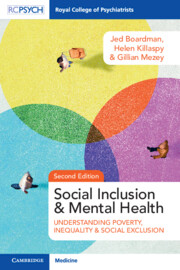Book contents
- Social Inclusion and Mental Health
- Reviews
- Social Inclusion and Mental Health
- Copyright page
- Contents
- Foreword to Second Edition
- Foreword to First Edition (2010)
- Preface
- Acknowledgements
- Chapter 1 Introduction: Poor, Excluded, and Unequal
- Section 1 Social Exclusion, Poverty, and Inequality
- Section 2 Participation of People with Mental Health Conditions
- Section 3 Including People
- Chapter 17 Enabling Social Inclusion for People with Mental Health Conditions: The Role of Mental Health Services
- Chapter 18 Theory into Practice
- Chapter 19 Broadening an Inclusive Approach
- Index
- References
Chapter 18 - Theory into Practice
from Section 3 - Including People
Published online by Cambridge University Press: 24 November 2022
- Social Inclusion and Mental Health
- Reviews
- Social Inclusion and Mental Health
- Copyright page
- Contents
- Foreword to Second Edition
- Foreword to First Edition (2010)
- Preface
- Acknowledgements
- Chapter 1 Introduction: Poor, Excluded, and Unequal
- Section 1 Social Exclusion, Poverty, and Inequality
- Section 2 Participation of People with Mental Health Conditions
- Section 3 Including People
- Chapter 17 Enabling Social Inclusion for People with Mental Health Conditions: The Role of Mental Health Services
- Chapter 18 Theory into Practice
- Chapter 19 Broadening an Inclusive Approach
- Index
- References
Summary
This chapter provides an overview of the methodological challenges in researching social inclusion amongst people with mental health conditions and gives examples of interventions that have been shown to be effective in addressing social exclusion including pre-school parenting programmes, early intervention, peer support, recovery colleges, self-care, self-management, and self-directed care. As with all clinical practice, the starting point is the establishment of a therapeutic relationship that encompasses empathy, understanding, hope, and a willingness to help, along with a recovery orientation encompassing collaborative and strengths-based approaches. Much of this does not require a major reorganisation of services, but rather a refocusing and reprioritisation of existing tools and clinical skills, alongside commitment by mental health organisations to ensure their structures facilitate service-user involvement in the planning and delivery of services
Keywords
Information
- Type
- Chapter
- Information
- Social Inclusion and Mental HealthUnderstanding Poverty, Inequality and Social Exclusion, pp. 359 - 373Publisher: Cambridge University PressPrint publication year: 2022
